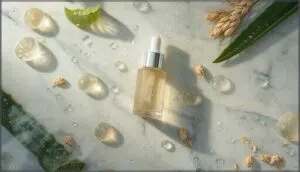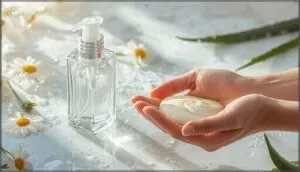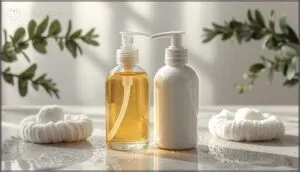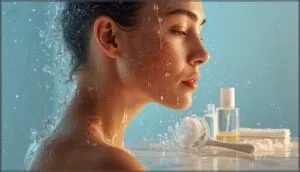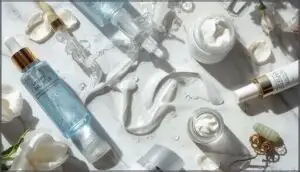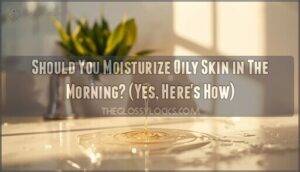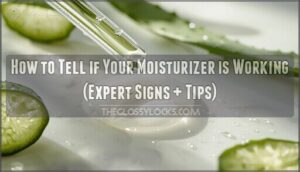This site is supported by our readers. We may earn a commission, at no cost to you, if you purchase through links.
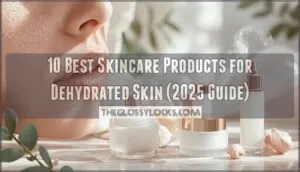
Between relentless air conditioning, city pollution, and skincare fads that overpromise and underdeliver, your skin’s natural moisture barrier never gets a break.
Skincare products for dehydrated skin work best when they target the root of the problem, replenishing water rather than simply adding oil. Knowing what truly satisfies parched skin means the difference between short-term comfort and a face that stays resilient against whatever the day throws at it.
Table Of Contents
- Key Takeaways
- Key Causes of Dehydrated Skin
- Essential Ingredients for Dehydrated Skin
- Best Cleansers for Dehydrated Skin
- Top 10 Skincare Products for Dehydrated Skin
- 1. CeraVe Hydrating Facial Cleanser for Dry Skin
- 2. Neutrogena Hydro Boost Gel Cream
- 3. La Roche-Posay Anthelios SPF 100
- 4. TATCHA Water Cream Face Moisturizer
- 5. Sunday Riley Good Genes Serum
- 6. Paulas Choice 2% BHA Exfoliant
- 7. EltaMD UV Clear Tinted Sunscreen
- 8. The Ordinary Niacinamide Blemish Serum
- 9. Drunk Elephant Babyfacial Exfoliating Face Mask
- 10. Kiehls Ultra Facial Cream Squalane
- Building a Hydrating Skincare Routine
- Expert Tips for Preventing Skin Dehydration
- Frequently Asked Questions (FAQs)
- Conclusion
Key Takeaways
- Dehydrated skin can affect any skin type and is mainly caused by environmental stressors, harsh products, and lifestyle habits that disrupt your skin’s moisture barrier.
- The most effective skincare for dehydrated skin relies on water-binding ingredients like hyaluronic acid, glycerin, and ceramides, while avoiding drying alcohols, sulfates, and heavy fragrances.
- Gentle, hydrating cleansers and layering products in the right order—serum first, then cream, followed by sunscreen—are key to restoring and maintaining skin hydration.
- Consistent habits like drinking enough water, using a humidifier, and adjusting routines with the seasons are just as important as topical products for keeping your skin healthy and resilient.
Key Causes of Dehydrated Skin
Your skin doesn’t dehydrate in a vacuum—it’s reacting to what’s happening around it and inside your body. Environmental stressors, lifestyle habits, and even confusion about your actual skin type can all play a role in moisture loss.
Let’s break down the primary factors that leave your skin thirsty, the critical difference between dryness and dehydration, and the warning signs you shouldn’t ignore.
Environmental and Lifestyle Factors
When your skin faces harsh weather, overheated rooms, or too many hot showers, it loses water faster than you can replace it, and your daily habits—like skipping sunscreen or using drying cleansers—can quietly accelerate the damage.
Pollution impact and stress levels disrupt your skin’s natural barrier, while poor sleep quality and diet choices make it harder for your body to maintain proper skin hydration, creating a cycle of persistent skin dryness and water loss that environmental factors can worsen.
Differences Between Dry and Dehydrated Skin
You might assume these two skin issues are the same, but dry skin is a skin type caused by low sebum production, while dehydrated skin is a temporary condition marked by insufficient water content that can affect any skin type. Environmental factors like low humidity worsen dehydration, whereas genetics drive persistent skin dryness.
Treatment methods differ: dry skin needs oil-rich moisturizing formulas, dehydrated skin benefits from water-binding humectants that restore skin hydration. Addressing dehydration often involves increasing oral hydration to replenish moisture.
Signs and Symptoms to Recognize
Recognizing dehydration early can prevent your skin from becoming dull, flaky, or prone to irritation, and the warning signs are often more subtle than you’d expect. Watch for these telltale signs that your skin concerns extend beyond typical dry skin:
- Dull Complexion: Dehydrated skin loses its natural radiance, appearing lackluster even after cleansing
- Increased Sensitivity: Your skin reacts more readily to products you previously tolerated without issue
- Fine Lines: Surface wrinkles become more pronounced, especially around your eyes and mouth
- Itchiness Scale: Persistent tightness or mild itching signals compromised skin hydration levels
Essential Ingredients for Dehydrated Skin
When your skin is crying out for water, the right ingredients can make all the difference between a quick fix and lasting relief. Understanding which actives truly hydrate—and which ones sabotage your efforts—helps you build a routine that works with your skin’s natural moisture barrier, not against it.
Let’s break down the powerhouse ingredients that should be on your radar, plus the culprits you’ll want to steer clear of.
Hyaluronic Acid and Its Benefits
Hyaluronic acid holds up to 1,000 times its weight in water, making it one of the most powerful hydrating ingredients you can apply to dehydrated skin. Research shows that topical hyaluronic acid serum increased skin water content by 134% immediately after application, with sustained hydration rising by 55% at six weeks of daily use. The best hyaluronic acid serum for dehydrated skin generally contains multiple molecular weights, allowing deeper penetration and surface-level moisture retention.
| HA Benefits | HA Types | HA Application |
|---|---|---|
| Immediate hydration boost | Low molecular weight | Apply to damp skin |
| Plumps fine lines | High molecular weight | Layer under moisturizer |
| Reinforces moisture barrier | Cross-linked polymers | Use morning and night |
Glycerin, Squalane, and Ceramides
Three powerhouse humectants—glycerin, squalane, and ceramides—work together to form what dermatologists call the “moisture trinity,” each addressing a distinct layer of your skin’s hydration needs.
- Glycerin benefits include drawing moisture from the air into your epidermis, making it essential for immediate skin hydration and moisture
- Squalane sources derived from olives or sugarcane mimic your skin’s natural oils, providing lightweight barrier protection
- Ceramide types (particularly ceramides 1, 3, and 6-II) repair the lipid matrix between skin cells, preventing transepidermal water loss
- Ingredient synergy occurs when these three work together in product formulations, creating complete dehydrated skin treatment
- Look for moisturizers containing all three ingredients for maximum effectiveness in restoring your moisture barrier
Ingredients to Avoid for Hydration
When building your dehydrated skin treatment plan, you’ll want to steer clear of specific culprits that undermine skin hydration and moisture. Alcohol effects include stripping up to 35% of stratum corneum moisture, while sulfate concerns center on a 28% increase in dryness after just two weeks. Fragrance risks bring a 40% spike in inflammatory dryness, and acid peeling agents like salicylic acid reduce water content by 20%. Paraben dangers involve elevated transepidermal water loss, making these ingredients counterproductive for hydrating skincare products focused on the importance of hydration.
Alcohol consumption can also lead to unwanted skin inflammation.
Best Cleansers for Dehydrated Skin
Choosing the right cleanser is like building a solid foundation for a house—get this step wrong, and everything else struggles to work properly. Harsh cleansers can strip away the protective barrier that keeps water locked in when your skin is already thirsty for moisture.
Let’s walk through the essentials of cleansing dehydrated skin without making the problem worse.
Importance of Gentle, Hydrating Cleansers
If your cleanser leaves your face feeling tight, squeaky, or stripped, it’s working against your skin’s moisture barrier rather than supporting it. Gentle cleansing with hydrating skincare products preserves your skin’s natural pH balance, usually between 4.5 and 5.5, which is essential for hydration after cleansing.
A facial cleanser formulated for dehydrated skin should:
- Remove impurities without disrupting ingredient compatibility with your barrier lipids
- Support ideal cleansing frequency—once or twice daily—without over-stripping
- Incorporate micellar water benefits or emollients that leave skin soft, not taut
How to Double Cleanse Without Stripping Moisture
Double cleansing doesn’t have to mean double damage—when you layer the right formulas, you can remove oil-based debris and water-soluble impurities while actually reinforcing your skin’s moisture reserves.
Start with an oil cleanser first to dissolve makeup and sebum, then follow with a cream cleanser second to lift remaining residue without stripping hydration.
Pat dry gently and apply hydrating toners immediately to lock in moisture.
Cleansing Mistakes That Worsen Dehydration
Even well-meaning cleansing habits can quietly sabotage your skin’s moisture barrier, turning a routine meant to refresh into one that leaves you tight, flaky, and more dehydrated than before. Hot water and harsh cleansers strip protective lipids, while over-exfoliating disrupts skin pH balance.
Inconsistent routines prevent proper hydration recovery, so stick to gentle facial cleansing techniques twice daily. Ignoring pH-balanced formulas compromises your barrier, making effective skin cleansing impossible.
Top 10 Skincare Products for Dehydrated Skin
When your skin’s thirsty, the right products can make all the difference between a complexion that feels tight and dull versus one that looks plump and healthy.
We’ve tested and analyzed the most effective formulations on the market, focusing on ingredients that actually work to restore your moisture barrier and lock in hydration.
Here are the ten products that consistently deliver results for dehydrated skin.
1. CeraVe Hydrating Facial Cleanser for Dry Skin
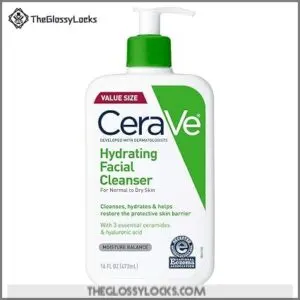
You’ll find CeraVe Hydrating Cleanser at the top of most dermatologist recommendations for dehydrated skin, and for good reason. This facial cleanser combines three essential ceramides with hyaluronic acid and glycerin, creating a foundation for your dry skin routine that actually works.
The Ceramide Technology uses MVE delivery to release moisture-supporting ingredients gradually throughout the day. Clinical studies show over 47% improvement in hydration after 28 days, and it’s earned National Eczema Association acceptance.
With a 4.7-star rating from over 121,000 consumer reviews, this non-comedogenic moisturizer-cleanser hybrid removes makeup without stripping your skin’s barrier—making ingredient analysis simple when you’re building an effective hydration strategy.
Best For: People with normal to dry, sensitive, or eczema-prone skin who need a gentle, non-stripping cleanser that hydrates while removing makeup and impurities.
- Clinically proven to increase skin hydration by 47% in 28 days using MVE technology that delivers ceramides and hyaluronic acid throughout the day
- Non-irritating, fragrance-free formula accepted by the National Eczema Association with minimal risk of allergic reactions or pore-clogging
- Strong consumer trust with 4.7 stars from over 121,000 reviews and top dermatologist recommendations for barrier repair
- Doesn’t foam or lather, which feels different than traditional cleansers and may not appeal to everyone
- Requires a separate moisturizer afterward for best results, so it’s not a complete one-step hydration solution
- May struggle with heavy or waterproof makeup removal on its own
2. Neutrogena Hydro Boost Gel Cream
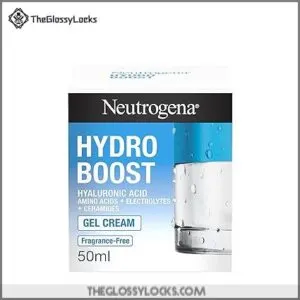
Neutrogena Hydro Boost stands out for dehydrated skin with its purified hyaluronic acid formula—holding up to 1,000 times its weight in water. Clinical data shows this moisturizer delivers 6 times more hydration than untreated skin, with effects lasting 48 hours.
The gel-cream absorbs quickly without clogging pores, making it compatible with acne-prone and sensitive skin types. Application tips: smooth over face and neck twice daily after cleansing.
At $12 for 50 milliliters, it’s earned 40,000 monthly sales and dermatologist recommendations for strengthening your dry skin routine’s moisture barrier.
Best For: People with dehydrated, dry, or sensitive skin who need long-lasting, lightweight hydration that won’t clog pores or interfere with makeup.
- Delivers clinically proven 48-hour hydration with hyaluronic acid that holds 1,000 times its weight in water, showing 6x more hydration than untreated skin
- Non-comedogenic gel-cream formula absorbs quickly and works well under makeup, suitable for acne-prone, sensitive, and combination skin types
- Affordable at $12 for 50ml with fragrance-free, dermatologist-tested ingredients that strengthen the moisture barrier after just one use
- Some users report receiving unsealed or damaged products, suggesting possible quality control issues with packaging
- Formula updates over time may affect performance consistency compared to earlier versions that users loved
- 50ml size runs out relatively quickly with twice-daily application, potentially requiring frequent repurchases
3. La Roche-Posay Anthelios SPF 100
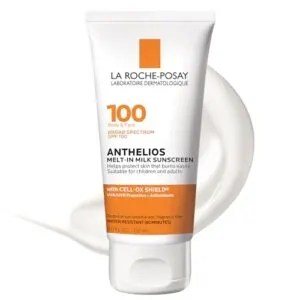
La Roche-Posay Anthelios SPF 100 pairs broad-spectrum sun protection with hydration support—blocking 99% of UVB rays while delivering moisture through panthenol and glycerin. Cell-Ox Shield technology combines UV filters with senna alata antioxidants, protecting against free radicals that degrade your skin barrier.
Clinical studies found 89% of users reported moisturized skin after one week, and 93% experienced soothing effects. The formula is oxybenzone-free, fragrance-free, and non-comedogenic, making it suitable for sensitive skin types prone to dehydration.
Water-resistant for 80 minutes, it’s earned over 90 beauty awards and Skin Cancer Foundation endorsement at $24.99 for 3 ounces.
Best For: People with sensitive or dehydrated skin who need maximum sun protection without irritation or white cast, especially those prone to sun damage or photoaging.
- Blocks 99% of UVB rays with SPF 100 while hydrating skin through panthenol and glycerin, with 89% of users reporting moisturized skin after one week
- Free of common irritants (oxybenzone, octinoxate, fragrance, parabens) and non-comedogenic, making it suitable for sensitive and acne-prone skin
- Fast-absorbing, lightweight formula that doesn’t leave white cast and stays water-resistant for 80 minutes during swimming or sweating
- Pricey at $38.99 for 6.17 ounces compared to other sunscreens on the market
- Some users experienced breakouts, suggesting it may not work for all skin types despite being non-comedogenic
- Requires reapplication every 80 minutes or after water exposure, which can be inconvenient for all-day outdoor activities
4. TATCHA Water Cream Face Moisturizer
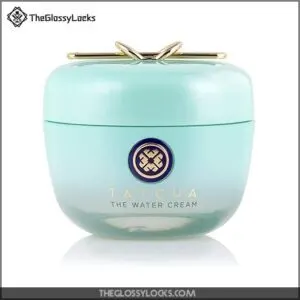
TATCHA Water Cream Face Moisturizer delivers a 621% boost in skin moisture after one use, thanks to its oil-free gel formula and multi-weight glycerin that penetrates while locking hydration.
The Hadasei-3 Complex—fermented green tea, rice, and algae—provides antioxidants alongside Japanese wild rose for pore refinement. Clinical studies showed 97% of participants experienced soothing after one week, plus a 27% skin barrier improvement in two weeks.
Its lightweight texture suits oily skin without clogging pores, while 23-karat gold adds a subtle, shine-free finish. At $72 for 50ml, it’s non-comedogenic and fits any skin care routine.
Best For: Anyone with oily or combination skin looking for lightweight, oil-free hydration that refines pores and strengthens the skin barrier without leaving a greasy finish.
- Delivers up to 621% increase in moisture after one use with fast-absorbing, water-burst gel texture that won’t clog pores or cause breakouts
- Japanese botanicals like wild rose and heartleaf visibly tighten pores and calm redness, with 97% of users reporting soothing benefits after one week
- Clean, fragrance-free formula improves skin barrier function by 27% in two weeks and works under makeup without pilling or shine
- High price point at $72 for only 50ml, which may not last long with daily use compared to larger, more affordable moisturizers
- Some users report quality control issues, including receiving partially used or unsealed products from certain retailers
- Thin, gel-like consistency may feel too lightweight for those who prefer thicker, creamier textures or need intense hydration in dry climates
5. Sunday Riley Good Genes Serum
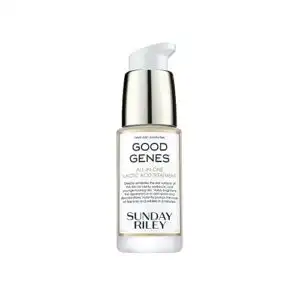
Sunday Riley Good Genes Serum uses purified lactic acid to exfoliate while preserving hydration—a gentler approach than glycolic acid formulas that can irritate dehydrated or sensitive skin. Licorice extract targets dark spots, while aloe and cactus extracts offset any potential dryness during exfoliation.
Clinical results showed 100% of users reported smoother skin after one application, with a 2025 study confirming visible fine line reduction within three minutes. At $85, you’re getting proven skin texture improvement—96% of users saw changes in two weeks.
Apply 1–2 pumps two to three times weekly, or rinse after 15 minutes if your skin runs sensitive. One bottle lasts roughly five months with this schedule.
Best For: Anyone with dehydrated or sensitive skin looking for a gentler lactic acid exfoliant that brightens, smooths texture, and reduces fine lines without harsh irritation.
- Clinical proof of results—100% of users saw smoother skin after one use, and 96% noticed texture improvement within two weeks
- Gentle enough for sensitive skin types with larger lactic acid molecules that reduce irritation compared to glycolic acid formulas
- Multi-benefit formula tackles fine lines, dark spots, texture, and dullness while hydrating ingredients offset potential dryness
- Expensive at $85, though one bottle lasts about five months with recommended usage
- Opaque packaging makes it hard to see how much product is left
- Some users may experience slight dryness or sensitivity with frequent use, especially if they have extremely reactive skin
6. Paulas Choice 2% BHA Exfoliant

Paula’s Choice 2% BHA Exfoliant delivers salicylic acid at a pH between 3.5 and 4.0, allowing it to dissolve sebum and clear pore congestion without compromising your moisture barrier—if you use it strategically.
Methylpropanediol and green tea extract cushion the exfoliation process, helping dehydrated skin tolerate BHA exfoliation two to three times weekly. You’ll see smoother skin texture and fewer blackheads within two weeks, though daily use risks redness and flaking.
Shake 1–2 times onto a cotton pad, then sweep across your face. At $37, expect visible results, but watch for product leakage during travel—up to 30% loss has been reported.
Best For: People with combination to oily skin dealing with clogged pores, blackheads, or rough texture who can commit to 2-3 weekly applications and proper moisturization.
- Clinical-strength 2% salicylic acid clears pore congestion and reduces blackheads within two weeks, with studies showing up to 50% reduction in acne lesions over 12 weeks.
- Methylpropanediol and green tea extract provide hydration and calming benefits, making it gentler than many competing BHA products.
- PH-optimized formula (3.5-4.0) maximizes exfoliation effectiveness while minimizing irritation risk for most users.
- Can cause initial purging, dryness, and flaking if used too frequently—especially problematic for dehydrated or sensitive skin types.
- Bottle design leads to up to 30% product leakage during travel, resulting in waste and user frustration.
- Relatively expensive at $37 compared to similar salicylic acid exfoliants on the market.
7. EltaMD UV Clear Tinted Sunscreen
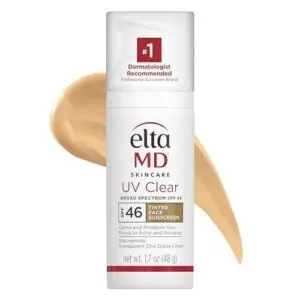
EltaMD UV Clear Tinted Sunscreen pairs 9% zinc oxide protection with 5% niacinamide and sodium hyaluronate, making it one of the best sunscreen options that hydrates while shielding dehydrated skin from UV damage.
The zinc oxide protection creates a mineral barrier without a white cast—92% of melanated-skin users confirmed invisible blending—while the niacinamide targets discoloration and blemishes. Sodium hyaluronate binds 1,000 times its weight in water, delivering hydration qualities that support your moisture barrier.
This tinted sunscreen benefits sensitive skin use, too; 93% of participants reported zero irritation, and its non-comedogenic formula suits acne-prone complexions. Apply liberally 15 minutes before sun exposure, then reapply every two hours.
Best For: Dehydrated, sensitive, or acne-prone skin needing mineral UV protection with hydration and tone correction.
- Combines SPF 46 zinc oxide protection with 5% niacinamide and sodium hyaluronate to hydrate while shielding skin from UV damage
- Tinted formula blends invisibly across skin tones with no white cast—92% of melanated-skin users confirmed seamless blending
- Non-comedogenic and fragrance-free with 93% of users reporting zero irritation, making it ideal for sensitive and breakout-prone complexions
- Small 1.7 oz size requires frequent repurchasing for daily users
- $47 price point may be steep compared to other mineral sunscreens
- Contains octinoxate, a chemical filter some research links to endocrine disruption—consult recent safety data if concerned
8. The Ordinary Niacinamide Blemish Serum
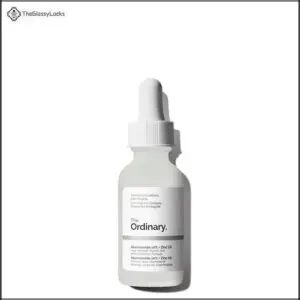
The Ordinary Niacinamide 10% + Zinc 1% Serum delivers a strong niacinamide concentration that targets blemish reduction and uneven skin texture, though its formulation demands careful use.
The 10% niacinamide pairs with 1% zinc PCA to regulate sebum and minimize visible pores, supporting your skin barrier while addressing congestion.
Clinical data shows the best niacinamide efficacy occurs at 2–5% concentrations, meaning this higher dose may trigger serum side-effects like irritation or breakouts, particularly in dry or sensitive complexions.
User experiences confirm best results with gradual introduction—start twice weekly, then increase as tolerance builds—to draw out its hydration and texture-smoothing benefits without compromising your moisture balance.
Best For: People with oily or acne-prone skin who want to reduce blemishes, minimize pores, and control shine, especially those willing to introduce the product gradually.
- High-strength formula at 10% niacinamide with 1% zinc PCA effectively regulates sebum production and visibly reduces pore size and congestion in oily skin types.
- Affordable at $6 with a lightweight, fragrance-free, non-greasy texture that absorbs quickly and layers well with other skincare products.
- Delivers visible improvements in skin radiance and texture within one week according to user reports, with clinical backing for barrier support and hydration benefits.
- The 10% concentration exceeds clinically optimal levels (2-5%), increasing the risk of irritation, dryness, and breakouts, particularly for sensitive or dry skin types.
- Requires gradual introduction and patch testing due to higher rates of side effects (18% in clinical settings), with many users reporting stickiness or purging during initial use.
- May not provide significantly better results than lower-concentration niacinamide formulas despite the stronger dose, with 2025 market trends favoring gentler alternatives.
9. Drunk Elephant Babyfacial Exfoliating Face Mask
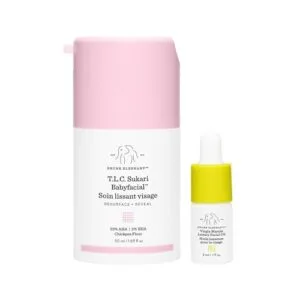
Drunk Elephant Babyfacial combines 25% AHA and 2% BHA exfoliation to resurface congested skin while supporting hydration through sodium hyaluronate. The face mask’s formulation includes niacinamide and antioxidants to protect your moisture barrier during chemical exfoliation.
Clinical study data involving 104 women showed 95% experienced revived skin and 93% noted baby-soft texture after 20-minute weekly application. User reviews confirm visible brightening and minimal irritation when you patch-test first and follow with non-comedogenic hydration.
Application safety requires daily sunscreen use during treatment and one week after, as Babyfacial ingredients increase photosensitivity while delivering facial products’ resurfacing benefits.
Best For: People with congested pores, uneven texture, or dull skin who want a powerful weekly exfoliation treatment and don’t mind spending on premium skincare.
- Clinical results show 95% of users experienced revived skin and 93% noticed baby-soft texture after 20-minute weekly use, with visible improvements in fine lines and pores.
- Combines 25% AHA and 2% BHA with hydrating sodium hyaluronate and niacinamide to exfoliate while protecting the moisture barrier, minimizing irritation compared to similar peels.
- Vegan, cruelty-free, and free from fragrances, drying alcohols, and essential oils, making it suitable for sensitive skin when patch-tested first.
- Expensive at $80 for less than 2 oz, making it a significant investment compared to budget alternatives like The Ordinary’s peeling solution.
- Requires strict daily sunscreen use during treatment and one week after due to increased photosensitivity from the acid blend.
- Can cause burning or tingling on sensitive skin and may lead to dryness or peeling if not followed with proper non-comedogenic hydration.
10. Kiehls Ultra Facial Cream Squalane
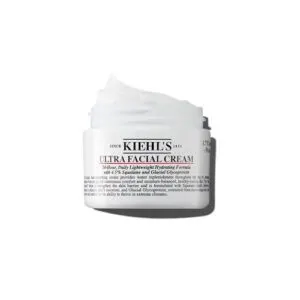
Think of Kiehl’s Ultra Facial Cream Squalane as the multitasker your skin’s been craving. It delivers Squalane Hydration and Barrier Repair in a lightweight, non-greasy formula tested on sensitive skin.
Backed by clinical results—72-hour moisture and repair within just one hour—this moisturizer’s Ingredient Analysis reveals glacial glycoprotein and pro-ceramides for true hydration.
Topped off with refillable packaging, Kiehl’s best moisturizer elevates dry skin treatments while supporting sustainability impact, making it a worthy addition to any routine.
Best For: Anyone needing long-lasting, gentle hydration—especially those with dry, sensitive, or compromised skin.
- Delivers 72-hour hydration that actually lasts.
- Lightweight, non-greasy, and absorbs fast without irritating sensitive skin.
- Eco-friendly, refillable packaging with responsible ingredients.
- Rich formula may feel heavy on oily skin.
- Jar doesn’t come with a pump (so application takes extra effort).
- Pricier than some alternatives and the jar is on the small side.
Building a Hydrating Skincare Routine
Finding the right routine for dehydrated skin can feel like a puzzle, but it all comes down to when and how you use your products. Think of each step as helping your skin retain moisture without feeling heavy or greasy.
Let’s look at where serums, creams, masks, and sunscreen fit in your daily lineup.
When to Use Serums, Creams, and Masks
Knowing when to reach for a serum, cream, or mask is a bit like picking the right tool for a job—each one shines brightest at a specific moment in your routine. Begin with hydration-focused serums right after cleansing—this is prime Serum Application Timing. Next, layer cream to lock it in.
Use a face mask weekly; leave Overnight Masks for when skin needs extra care.
The Role of Sunscreen in Hydration
Just as you wouldn’t skip moisturizer, sunscreen is a non-negotiable—especially when dehydration is in play.
Routine UV protection doesn’t just prevent damage; the right sunscreen can boost moisture retention, reduce TEWL, and even improve your skin biophysics.
Look for ceramide benefits in your formulas; these build a stronger barrier, keeping hydration locked in alongside everyday skin protection.
Expert Tips for Preventing Skin Dehydration
You can’t rely on products alone to keep your skin hydrated. The way you care for your skin each day matters just as much as what you put on it.
Here’s how you can make a real difference.
Daily Habits to Maintain Hydration
While the latest serum can work wonders, the little things you do each day often make the biggest difference in keeping your skin hydrated. Prioritize steady water intake, opt for a humidifier to counter dry indoor air, and lean on a diet that fosters hydration. Moisturize after cleansing, sleep well, and let gentle exercise fuel healthy skin—all skin types benefit.
How to Adjust Your Routine Seasonally
Changing weather sets the rhythm for your skin care routine. In winter, prioritize thick winter moisturizers, and cut back on seasonal exfoliation to guard your barrier. As summer rolls in, gentle summer cleansers and lighter hydration formulas suit most skin types.
Adjust sunscreen seasons—SPF daily, regardless of forecast. Active ingredients may need tweaking, depending on your skin’s needs.
Lifestyle Changes to Support Skin Moisture
Just as you swap your favorite sweater for a tee come summer, a few everyday tweaks can help your skin retain moisture no matter what’s in the forecast.
Prioritize dietary hydration and sleep quality, add a humidifier to your routine, and watch stress and exercise impact.
These changes support hydration, underpinning both skin health and your expert skincare advice.
Frequently Asked Questions (FAQs)
How long before results show with hydrating products?
Imagine this: Immediate hydration is felt within minutes, but long-term effects like improved skin moisturization appear over two to six weeks.
Product consistency truly matters, and individual variation is real, as confirmed by clinical trial data on hydration and moisturizers.
Can makeup worsen dehydration in the skin?
Makeup can worsen dehydration, especially with products containing alcohol or clay. Paying attention to ingredient impact, choosing hydrating formulations, applying moisturizer before makeup, and using gentle removal methods strengthens skin moisturization and helps maintain hydration.
Skin Care Advice: prioritize product selection.
Are overnight masks safe for sensitive dehydrated skin?
Like a gentle blanket, overnight masks can work wonders on dehydrated skin—if ingredients are chosen wisely.
Always patch test for sensitive skin reactions, verify hydration levels, and prioritize mask ingredient safety before making them part of your routine.
Do supplements help improve skin hydration?
Supplements like oral hyaluronic acid, collagen, omega fatty acids, and vitamin D show modest potential for supporting skin hydration.
Still, their overall supplement efficacy pales next to moisturizers and expert skin care advice for best skin health.
How often should you exfoliate dehydrated skin?
Smooth, subtle, and safe exfoliation frequency is key for dehydrated skin—usually once or twice a week, adjusting for skin sensitivity, product types, and seasonal changes.
Watch for over-exfoliation signs, and always hydrate with a moisturizer after skin exfoliation.
Conclusion
Persistent protection and purposeful products pave the path to plump, resilient skin. You don’t have to surrender to tightness or tolerate temporary fixes—when you know which skincare products for dehydrated skin genuinely nourish, you gain back comfort, confidence, and clarity.
Think of each step as an investment in your skin’s strength, not just a fleeting relief. True hydration doesn’t shout; it quietly transforms, restoring balance and barrier. Your complexion deserves more than a bandage—it deserves enduring, expert-driven care.
- https://pmc.ncbi.nlm.nih.gov/articles/PMC8322246/
- https://athenaeumpub.com/wp-content/uploads/Management-of-Dry-and-Dehydrated-Skin-and-Effect-of-Optimal-Hydration-Range-A-Survey-on-Indian-Dermatologists-and-Cosmetologists-Insights-and-Patient-Experiences.pdf
- https://www.crodabeauty.com/en-gb/resources/blog/skin-flooding-the-latest-trend-in-skin-hydration
- https://www.einpresswire.com/article/814625004/dehydrated-skin-product-market-to-grow-significantly-with-rising-demand-for-hydrating-skincare-solutions
- https://www.cosmebio.org/en/reports/effectiveness-cosmetic-products-what-you-should-know-claims-regulation-active-ingredients/

